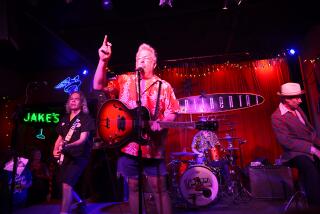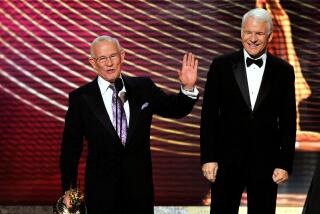After 50 Years, Tom Dixon Still Has a Classic On-Air Style
- Share via
Ask Tom Dixon, who is the Southland’s longest-running radio host and an innately modest man, to account for his longevity in an essentially ephemeral business, where personalities and formats tend to come and go, and he replies emphatically: “Luck.”
Then Dixon, the six-night-a-week host of classical KKGO-FM’s (105.1) “Evening Concert” from 8 to 10, reflects after a pause: “By having a knowledge of classical music, I fell into a format that never changes. If I had been a red-hot disc jockey for a trend--big bands or whatever--I would have been gone. . . . Classical music, from the time I started at KFAC in 1946, is the same commodity.
“This has been my livelihood for 50 years,” adds Dixon, whose anniversary was earlier this month, “and as long as I can do it, or they’ll let me do it, I’ll continue.”
No one else comes close to his record. Consider that, among local radio veterans, Casey Kasem has been counting down rock hits for 33 years, that KABC-AM (790) talk host Michael Jackson marks his 30th anniversary in December and that conservative commentator George Putnam has been on radio and KIEV-AM (870) a mere 20 years (after a long career in local television).
Yet Dixon has lasted half a century because he also wears well. (It’s been longer than that if you count the three years, from late 1939 to 1943 at KHJ-AM, where he did everything from dance band remotes to a program called “Women Are Wonderful,” involving women’s clubs.) After all, how can a man who emceed some early TV, including “Queen for a Day” and “Pet Showcase,” be stuffy?
His broadcast voice is a mellow baritone, and he sounds considerably younger than his 80 years. When you tell him that over lunch with his wife, Katie, in their white cottage Burbank home with a picket fence out front--it’s the house in which TV’s “Our Miss Brooks” was filmed--he responds: “I do? . . . It’s probably the microphone. I’m going to put one in every room,” he adds with a laugh.
At a glance, it would seem Dixon has a difficult schedule, but in fact he no longer broadcasts live. Instead, on Wednesday nights and Sundays, he tapes a week’s worth of remarks at KKGO in West Los Angeles. Still, he puts in close to 40 hours weekly doing research for his scripts, which he types on an Olympia manual typewriter, 1947 or ‘48, as shiny as a vintage car.
On the air, Dixon makes a point of not talking too much. In two hours, he presents just under four minutes of commentary about “the composer--struggles and idiosyncrasies, that sort of thing. . . . I don’t think people want to hear too much. In other words, the music is what you’re presenting, not yourself.”
For example, in presenting Handel’s “Royal Fireworks” piece recently, Dixon noted that the composer originally scored the piece “basically for winds” because it was to be heard in an outdoor festival. “He later revised it for a more conventional orchestral setting . . . probably inspired by the inferior wind players in London at the time.” The audience heard the original composition--”Handel’s original idea . . . remains superior”--done by the Cleveland Symphony Winds.
Dixon rarely interjects his own opinion, particularly if the station is playing a modern piece. “I’m accustomed to the old style,” he says. Only on the outside does he reveal preference. His car bears the bumper sticker “I Love Mozart.”
Ernest Fleischmann, executive vice president and managing director of the Los Angeles Philharmonic, calls Dixon “classical music’s favorite uncle. He’s made a lot of people sort of look at classical music as something that doesn’t threaten. There’s something so wonderfully unpretentious [about him].”
Most of Dixon’s career--40 years--was spent at KFAC. But in 1986 he was fired. Saul Levine, KKGO’s general manager, says Dixon and several other hosts were let go by the now-defunct station because management “wanted a younger sound.” Dixon declines to talk about that period.
Before going to KKGO in 1989, he had a nighttime program at KUSC-FM (91.5), from July 1987 to May 1988, which he also taped in advance.
Levine says he had been a fan of Dixon’s for a long time. As a student in the 1950s, he visited Dixon at KFAC in mid-Wilshire. “He was sort of a hero: his style, his knowledge of classical music, his authoritative and likable manner of expression. He has passion for the music.”
That passion was transmitted by Dixon’s English-born father, who moved his family from Edmonton, Canada, to Los Angeles when Dixon was 7. At 9, he attended his first concert at the Hollywood Bowl.
“Then my father, knowing a 9-year-old kid was going to be a pain in the neck, sat us near a pepper tree and said, ‘Thomas, you can play in that pepper tree but you have to play quietly.’ So I did. Then at Christmas he took me to an indoor concert--the same year, 1924. Imagine a 9-year-old kid breaking into classical music with the ‘Messiah.’ ”
A 1935 graduate of Los Angeles City College, majoring in drama, Dixon never took a music appreciation class or played an instrument. But he continued to listen. When a bout with tuberculosis prevented him from pursuing an acting career, he went into radio.
“One of my life’s biggest regrets is that my father didn’t live long enough to see his son make a living broadcasting classical music after he’d given me the gift of loving it,” he says.
Off the air, Dixon is quite a storyteller--a lot of times on himself. Like how he used to “chitchat” with a young model whom he knew as Norma Jean at the Ambassador Hotel coffee shop--and didn’t know that she went on to become Marilyn Monroe until someone pointed it out.
Or how he goofed in a radio interview with Beverly Sills, who had told him during intermission that she was staying at the Beverly Hills Hotel. “So I said, ‘Welcome back to ‘Luncheon at the Music Center.’ My guest is the great soprano Beverly Hills. And before I could apologize and correct it, she starts to giggle. ‘Tom, there is a girl in town at the Largo who takes her clothes off for a living, and her name is Beverly Hills. I don’t think anyone would pay 25 cents to see me [do that].’ Now this was live. . . .”
Once, Dixon says, he was “asked by a P.R. person what my approach was” to classical music. “And I said, I can’t approach it in an academic sense. This, unfortunately, kind of puts you down like you don’t have lofty ideas. I don’t think you have to. Classical music triggers your imagination. It’s to be enjoyed.”
More to Read
The biggest entertainment stories
Get our big stories about Hollywood, film, television, music, arts, culture and more right in your inbox as soon as they publish.
You may occasionally receive promotional content from the Los Angeles Times.






